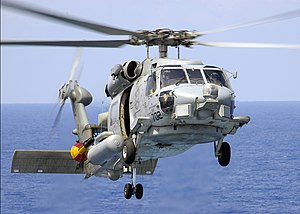SH-60 Sea Hawk
| SH-60 / HH-60H / MH-60 Seahawk | |
|---|---|
 |
|
| U.S. Navy SH-60B landing on USS Abraham Lincoln. | |
| Role | Multimission maritime helicopter |
| National origin | United States |
| Manufacturer | Sikorsky Aircraft |
| First flight | 12 December 1979 |
| Introduction | 1984 |
| Status | In service |
| Primary users |
United States Navy Royal Australian Navy |
| Produced | 1979–present |
| Unit cost |
US$42.9 million (MH-60R in FY2012)
US$28.1M (MH-60S in FY2012) |
| Developed from | Sikorsky UH-60 Black Hawk |
| Variants |
Sikorsky HH-60 Jayhawk Mitsubishi SH-60 |
The Sikorsky SH-60/MH-60 Seahawk (or Sea Hawk) is a twin turboshaft engine, multi-mission United States Navy helicopter based on the United States Army UH-60 Black Hawk and a member of the Sikorsky S-70 family. The most significant airframe modification is a hinged tail to reduce its footprint aboard ships.
The U.S. Navy uses the H-60 airframe under the model designations SH-60B, SH-60F, HH-60H, MH-60R, and MH-60S. Able to deploy aboard any air-capable frigate, destroyer, cruiser, fast combat support ship, amphibious assault ship, or aircraft carrier, the Seahawk can handle anti-submarine warfare (ASW), anti-surface warfare (ASUW), naval special warfare (NSW) insertion, search and rescue (SAR), combat search and rescue (CSAR), vertical replenishment (VERTREP), and medical evacuation (MEDEVAC). All Navy H-60s carry a rescue hoist for SAR/CSAR missions.
During the 1970s, the U.S. Navy began looking for a new helicopter to replace the Kaman SH-2 Seasprite. The SH-2 Seasprite was used by the Navy as its platform for the Light Airborne Multi-Purpose System (LAMPS) Mark I avionics suite for maritime warfare and a secondary search and rescue capability. Advances in sensor and avionic technology lead to the LAMPS Mk II suite, but the SH-2 was not large enough to carry the Navy's required equipment. In the mid-1970s, the Army evaluated the Sikorsky YUH-60 and Boeing-Vertol YUH-61 for its Utility Tactical Transport Aircraft System (UTTAS) competition.
...
Wikipedia
